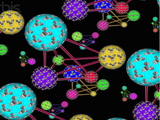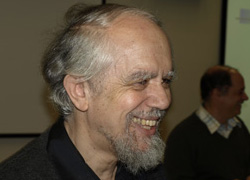IMDEA Networks

Archivos: Events
Energy-Efficient Wireless Access Networks
Energy efficiency is one of the great technological challenges of our times. Recently, the concerns for the environmental consequences of the huge rate with which energy is consumed is leading to the awareness that electricity consumption and waste should be reduced in all sectors. The ICT (Information and Communication Technology) sector makes no exception, since it is becoming a major component of the worldwide energy consumption budget.
Seguir leyendo arrow_right_alt
Content centricity as central paradigm in Content Networking
The concept of Content Networks (CN) has extended Content Distribution Network (CDN) research in order to also comprise other aspects beyond delivery optimization. One central element of this research is the recognition that users are ultimately interested in the content (or a piece of information) and not any specific copy. This resulted in research on content addressing that allows general content access, i.e., the goal is retrieving content (or information) rather than routing of packets between end hosts. This is called Content-Centric respectively Information-Centric Networking (CCN/ICN). For some time these concepts have been explored for the better provision of and access to content services.
Seguir leyendo arrow_right_altRecouping Opportunistic Gain in Dense Base Station Layouts Through Energy-Aware User Cooperation
To meet the increasing demand for wireless capacity, future networks are likely to consist of dense layouts of small cells. Thus, the number of concurrent users served by each base station (BS) is likely to be small which results in diminished gains from opportunistic scheduling, particularly under dynamic traffic loads. We propose user-initiated BS-transparent traffic spreading that leverages user-to-user communication to increase BS scheduling flexibility.
Seguir leyendo arrow_right_altAddressing resource issues in new live video streaming systems
The delivery of live video streams over the plain old best-effort Internet is a major challenge. This talk deals with the issue of under-provisioning in the main delivery platforms, i.e. when the equipments that are in charge of delivering the video do not have enough upload capacity to serve all clients. In general, Content Delivery Networks (like Akamai) make a good job in ensuring large-scale delivery of the most popular streams through edge-servers that are located close to the clients.
Seguir leyendo arrow_right_altJornadas REDIMadrid 2008 – Investigación de frontera en red
The objective of these symposia is to celebrate idea-sharing sessions on the importance of the technological medium of telematic networks in general, and of the REDIMadrid network in particular, for the development of leading research activity at World level. The collaborative support on the activity of distributed research groups, GRID environments, distributed super-computers and scientific databases are examples of its application to almost any field of scientific research. Two emerging areas of research will be the focus of attention: the e-medicine and the e-participation.
Seguir leyendo arrow_right_altReputation-based Mechanisms for Evolutionary Master-Worker Computing
We consider Internet-based Master-Worker task computing systems, such as SETI@home, where a master sends tasks to potentially unreliable workers, and the workers execute and report back the result.
Seguir leyendo arrow_right_altOnline Testing of Distributed Systems
It is notoriously difficult to make distributed systems reliable. This becomes even harder in the case of the widely-deployed systems that are heterogeneous (multiple implementations) and federated (multiple administrative entities).
Seguir leyendo arrow_right_altDefensa Tesis Doctoral: Experimental Analysis of the Socio-Economic Phenomena in the BitTorrent Ecosystem
BitTorrent is the most successful Peer-to-Peer (P2P) application and is responsible for a major portion of Internet traffic. It has been largely studied using simulations, models and real measurements. Although simulations and modelling are easier to perform, they typically simplify analysed problems and in case of BitTorrent they are likely to miss some of the effects which occur in real swarms.
Seguir leyendo arrow_right_altVirtual Reality and Haptics Applications in e-Learning, Industrial Training and Medical Education
Nicolas Georganas received the Dip. Ing. (Diplom-Ingenieur - German equivalent of M.Sc. degree) in Electrical Engineering from the National Technical University of Athens (Athens, Greece) in 1966. He went on to achieve his Ph.D. in Electrical Engineering (Summa cum Laude) in 1970 from the University of Ottawa (Ottawa, Canada). In 2004, he was conferred a Dr-Ing. (Doktor Ingenieur) (honoris causa) in Electrical Engineering by the Technische Universität Darmstadt (Darmstadt, Germany). In 2007, he was awarded his second Ph.D. (honoris causa) in Electrical and Computer Engineering by the National Technical University of Athens. He currently holds the position of Distinguished University Professor in the School of Information Technology and Engineering (SITE) of the University of Ottawa. In addition to this, he is also a Visiting Researcher at IMDEA Networks and a Cátedra de Excelencia at University Carlos III of Madrid (UC3M). In 1986 he became the Founding Dean of the University of Ottawa’s Faculty of Engineering, and from 2005-08 served as Associate Vice-President, Research (External).
Seguir leyendo arrow_right_altFlat Access and Mobility Architecture: an IPv6 Distributed Client Mobility Management solution
The use of centralized mobility management approaches – such as Mobile IPv6 – poses some difficulties to operators of current and future networks, due to the expected large number of mobile users and their exigent demands. All this has triggered the need for distributed mobility management alternatives, that alleviate operators’ concerns allowing for cheaper and more efficient network deployments.
Seguir leyendo arrow_right_alt












Comentarios recientes